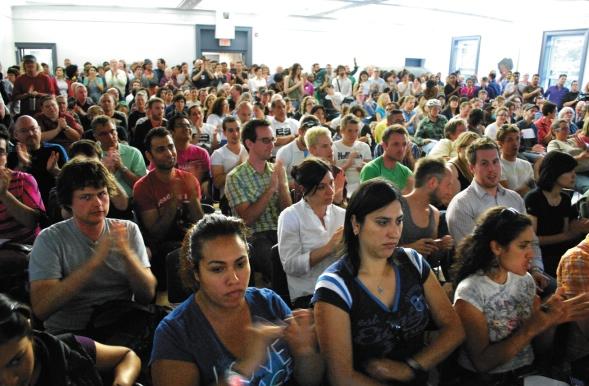Go to Pride Toronto (PT) events and defy the ban — that is the message queer activists are sending partiers in the lead-up to Toronto’s gayest weekend.
That stands in contrast to early calls for a boycott; most now plan to use official events to denounce organizers and make statements about PT and censorship.
Since PT announced its ban on the term “Israeli apartheid” on May 25, gay people have been organizing through Facebook and in person to convince PT to reverse its decision.
The Pride Coalition for Free Speech — an ad hoc group founded to fight the ban — hosted a meeting at the 519 Church Street Community Centre on June 7 that drew more than 300 people.
Roy Mitchell, a member of the coalition, says he’s watching people organize in a flurry — everything from skits to banner-making — as people turn their frustration into action.
“We want Pride. We love Pride. We probably love it more than we ever had,” he says.
He’s never seen this kind of energy before, he says.
Those who oppose PT’s decision to censor QuAIA, no matter how they feel about the Middle East, are invited to march with the Pride Coalition for Free Speech — if its application is approved by PT staff, that is.
“We are happy to take anyone under our banner who wants to join us,” says Mitchell, who is also organizing a free-speech cabaret on June 29.
Those marching with other groups can contact the coalition if they want to carry free-speech signs during the parade, he says, although they’re still working out how to pay for everything.
Outrage over the censorship decision is tapping into other longstanding grievances with PT: the organization’s lack of transparency; its relationship with corporate and city funders; its treatment of programming for trans people and people of colour; its muzzling of artists through PT’s performer contract.
At a June 12 coalition meeting, some talked about whether they should use the banned term, “Israeli apartheid,” in their messaging. Some argued the term was divisive, while others said that using the contested term is an important way of protesting censorship.
 While they settled on “Our Pride includes free speech” as their overarching theme, some will add “PS Israeli apartheid” to their banners, placards and T-shirts in order to defy the ban without making a statement about Israeli foreign policy. When the panellists of PT’s human rights program pulled out, they used that phrase to thumb their noses at the ban.
While they settled on “Our Pride includes free speech” as their overarching theme, some will add “PS Israeli apartheid” to their banners, placards and T-shirts in order to defy the ban without making a statement about Israeli foreign policy. When the panellists of PT’s human rights program pulled out, they used that phrase to thumb their noses at the ban.
A protest of the Pride flag-raising at City Hall is set for June 28. As an event that brings together both PT and City of Toronto officials — under the watchful eye of camera crews — it’s a ripe target.
Pride belongs to the queer community, not PT: that was another recurring theme at the coalition’s community meeting. Amy Gottlieb and Sasha Van Bon Bon both hammered the point home.
“Excuse me, Martin Gladstone,” said Gottlieb, referring to one of the chief agitators for the ban, “but we are reclaiming our Pride.”
Van Bon Bon, who is organizing Take Back the Dyke to compete directly with the PT Dyke March, announced her plans to rousing applause.
“It’s not an alternative to the Dyke March. It is the Dyke March,” she said. “We’re taking back our fucking march.”


 Why you can trust Xtra
Why you can trust Xtra


